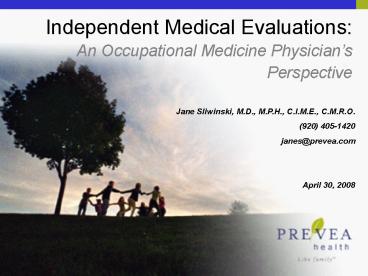Independent Medical Evaluations:
1 / 21
Title:
Independent Medical Evaluations:
Description:
4. End of Healing (EOH) date. 5. Permanent Partial Disability (PPD) rating ... When physician says employee is 'totally incapacitated' and it's a non-surgical case; ... –
Number of Views:31
Avg rating:3.0/5.0
Title: Independent Medical Evaluations:
1
Independent Medical Evaluations An Occupational
Medicine Physicians Perspective
Jane Sliwinski, M.D., M.P.H., C.I.M.E.,
C.M.R.O. (920) 405-1420 janes_at_prevea.com April
30, 2008
2
Independent Medical Exams (IME)
- Content
- 1. Diagnosis
- 2. Causation Assessment
- 3. Treatment Recommendations
- 4. End of Healing (EOH) date
- 5. Permanent Partial Disability (PPD) rating
- 6. Return To Work Recommendations
3
Independent Medical Exams (IME) cont.
- When?
- Total incapacitation
- Inappropriate Return To Work Recommendations
- Diagnosis is unclear
- High PPD rating
- When patient has a prolonged recovery time (gt6
weeks) Note Normal tissues heal in 6 weeks.
4
Independent Medical Exams (IME) cont.
- When?
- Excessive Treatment - No EOH date
- Symptoms/condition greater than expected based on
mechanism of injury - Causation unclear.
5
Independent Medical Exams (IME) cont.
- Why?
- To help patient by providing proper diagnosis and
treatment recommendations - To potentially end work comp claim and
associated costs - To obtain an appropriate PPD rating to reduce
PPD related costs - To reduce lost work time, light duty time
associated costs.
6
(No Transcript)
7
(No Transcript)
8
(No Transcript)
9
(No Transcript)
10
(No Transcript)
11
(No Transcript)
12
(No Transcript)
13
(No Transcript)
14
Record Reviews
- Why?
- To get MD opinion on specific questions
- To get claim reviewed early in claim, to
hopefully shorten (or eliminate) duration of
claim. - Doesnt use up IME (1 IME per year allowed by
Wisconsin Workers Compensation Law) - Cheaper than an IME (no patient transportation
costs, no lost work time, no patient/MD
interaction time)
15
Record Reviews (cont.)
- Can do a brief review or a full report
- Legally defensible
- Examples
16
Fitness For Duty (FFD) Evaluation
- Why should employers send employees for FFD
Evaluations? - To see if employee can safely perform all of the
essential functions of the jobif not, which ones
can/cant they do are there any
accommodations/restrictions advised? - To determine if a medical condition could be
aggravated by doing all essential functions of
the job - To determine if performing the job could lead to
a high risk of substantial imminent harm - When physician work restrictions are vague, seem
inappropriate, or change dramatically overnight
17
Fitness For Duty (FFD) Evaluation
- When physician says employee is totally
incapacitated and its a non-surgical case - Cost savings occur by preventing work injuries
preventing legal challenges to ADA violations
reducing lost work time costs reducing FMLA use,
and Short Term/Long Term Disability claim use - Examples
18
Causation Consultations
What are they? Consults that assess the
work-relatedness of a condition
- Why should an employer have a causation
consultation done? - To potentially deny questionable W/C injury or
illness claims - To help patient if not W/C, recovery is faster
- To assess for pre-existing conditions, if job
task caused a manifestation of symptoms from the
pre-existing condition, rather than aggravating
or accelerating the condition - Saves company money by reducing w/c injury
illness claims and associated costs.
19
Causation Consults (cont.)
- When should an employer get a Causation Consult?
- With any claim with no specific injury
- With any claim with a syndrome diagnosis
- When the symptoms/condition are much worse than
expected based on the mechanism of injury - Content
- Medical Record Review
- Company Record Review (injury report, nursing /
supervisor notes, job description) - Optional
- Occupational Therapist Job Site
Evaluation - Physician Job Site Evaluation
- Job Video
20
Causation Consults (cont.)
- Examples
21
Independent Medical Evaluations An Occupational
Medicine Physicians Perspective
Jane Sliwinski, M.D., M.P.H., C.I.M.E.,
C.M.R.O. (920) 405-1420 janes_at_prevea.com April
30, 2008































